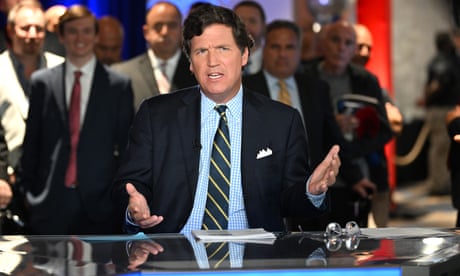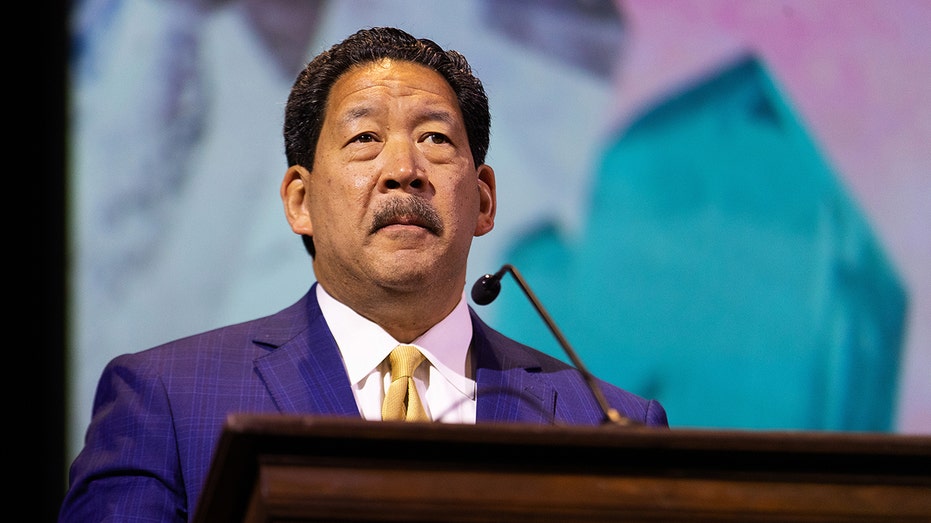- by foxnews
- 10 Mar 2025
Tucker Carlson has lost his job - but the far right has won the battle for the mainstream | Owen Jones
Tucker Carlson has lost his job - but the far right has won the battle for the mainstream | Owen Jones
- by theguardian
- 30 Apr 2023
- in politics

It is difficult to begrudge anyone for celebrating the downfall of far-right provocateur Tucker Carlson, ignominiously ejected from Fox News. Slack-jawed, spitting rage, his tirades were calculated at stirring the resentment of angry white America: from declaring that immigrants made the US dirtier and poorer to embracing the "great replacement theory", which spreads the noxious lie that the authorities were deliberately "undermining democracy" by replacing US-born Americans with immigrants.
Fox staff were reportedly jubilant at his departure. Perhaps this quote from a Fox reporter, in which they celebrate seeing the back of the network's premier conspiracy theorist, will give you pause: "It's a great day for America, and for the real journalists who work hard every day to deliver the news at Fox."
Oh, really? Were they the journalists who prompted a potential lawsuit from the city of Paris after falsely claiming the French capital had "no-go zones" for non-Muslims? Or aired many negative and sceptical statements about Covid vaccines at a critical point in the pandemic? Or indeed aired the false claims that voting machines had been rigged to steal the 2020 presidential contest, leading to Fox News' $787m settlement with Dominion Voting Systems? With journalistic standards like these, Carlson will no doubt be replaced by another demagogue committed to stoking the same fear and rage. The focus on specific bogeymen such as him stops us from understanding the real problem.
Carlson is merely one figurehead of a misinformation industry that has dramatically reshaped rightwing politics across the world. Defined by conspiratorial thinking, often crude racism and bigotry, and calculated deception, it has succeeded in destroying whatever barrier existed between the traditional centre right and what lies beyond. Carlson - or indeed the modern godfather of this movement, Donald Trump - are easy to single out on account of their vulgarity and open repudiation of respectability. This allows the mainstream right that originally courted and enabled this extremism to evade responsibility.
Consider the case study of Liz Cheney, the three-term representative for Wyoming, celebrated as a principled leader of the besieged moderate Republicans for her opposition to Trump. This was the same Cheney who, when offered the opportunity to eschew the conspiracy that Barack Obama was foreign-born, responded: "People are uncomfortable with a president who is reluctant to defend the nation overseas." Here was a climate denier who almost always voted with the Trump administration. Difficult, then, not to conclude that it was the style, rather than substance, of Trumpism that the likes of Cheney found so objectionable. Cheney was crushed in her Republican primary at the hands of a Trump-backed candidate - consumed by a monster she helped create.
It was the "moderate" Republican pinup John McCain who selected Sarah Palin as his running mate. It was the former Republican presidential nominee Mitt Romney who suggested wiretapping mosques and placing foreign students under surveillance. It was the presidential candidate Ted Cruz who called on law enforcement to "patrol and secure Muslim neighbourhoods". And a previous generation of rightwing zealot pundits walked so Carlson could run: like the late Rush Limbaugh who identified the "four corners of deceit": government, academia, science and the media.
It was, in sum, a collective effort on the US right to promote bigoted and conspiratorial modes of thinking that radicalised the base of the Republicans and transformed a rightwing capitalist party into a more conventionally far-right movement that increasingly rejects democratic norms. It's why Trump's main Republican rival is Florida governor Ron DeSantis, a rightwing authoritarian who has suggested the Federal Reserve will seek to prevent Americans buying guns and fuel, and who has shared a platform with people who appear to echo QAnon and other conspiracy theories.
This is a tendency long ago identified by the US historian Richard Hofstadter, who unpacked the "paranoid style in American politics" in a 1964 article. This was a mechanism, he believed, for remoulding society: that by identifying a menace to society - be it Muslims, trans people, or anti-fascists - you could marshal support for radical right causes.
It is a phenomenon well beyond the United States. It was the Vote Leave faction that took over the Tories who spread the deception about Turkey joining the EU; Michael Gove who denounced "experts"; and Boris Johnson's ugly rhetoric around surrender, betrayal and traitors that attracted the support of far-right extremists. It was Brazil's Jair Bolsonaro who synthesised bigotry towards Brazilian minorities and disinformation about Covid and stolen elections. And it is Hungary's far-right regime that spreads antisemitic conspiracy theories about Jewish businessman George Soros, and implies that outside forces will force children to have gender-affirming surgery.
Indeed, Hungary itself is a striking case study about what has happened to the modern right globally. The ruling party, Fidesz, was long considered a conventional centre-right party until it radicalised in power, hollowing out the substance of Hungarian democracy. Misinformation, bigotry and conspiracism acted as battering rams, radically reshaping rightwing politics.
Carlson may well have been booted from Fox News, but what victory does it represent? The brand of conspiratorial demagoguery he belongs to has succeeded in drastically reshaping rightwing politics. The "paranoid style" that was once identified as a dangerous trend in conservatism is now its main operating system. The consequence? Democracy as we understand it is imperilled in the US and beyond. The likes of Carlson played their role, but this political catastrophe would never have happened without those who retained ill-deserved reputations for moderation while throwing open the door for the most radical extremism.
- by foxnews
- descember 09, 2016
Ancient structure used for cult 'rituals' discovered by archaeologists
A Neolithic Timber Circle was discovered by archeologists in Denmark resembling the historical landmark Stonehenge in the U.K. It is open to be viewed by the public.
read more





